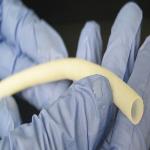February 03, 2011

Photo: Science/AAAS
The bioengineered vein, which can be stored for up to a year, is implanted using standard surgical techniques.
Scientists say they have successfully tested artificial blood vessels grown in the laboratory.
In a heart bypass operation, surgeons typically remove a vein from a patient's leg and use it to replace blocked arteries that feed the muscles of the heart. But what if, instead of cutting open the patient's leg, the surgeon used an artificial blood vessel that has been sitting in a hospital refrigerator? The new research suggests that day may soon come.
The artificial blood vessels are made by coating a biodegradable, plastic mesh tube with human or animal muscle cells. The cells produce a protein structure shaped like the plastic tube, which dissolves.
Shannon Dahl is co-founder of Humacyte, the North Carolina company that developed the artificial blood vessel. She explains that the next step is washing away the original muscle cells.
"So that what we're left with - the bioengineered vein - is just the proteins that the cell secreted. This protein structure, the bioengineered vein, can be used in any human patient because the immunogenic part, the cells, have been removed," Dahl says.
The material is considered immunogenic since the protein structure won't be recognized by the recipient as foreign material.
The artificial grafts resist bursting and tearing in lab tests, but the real question is how they perform when used on an actual patient.
The research team implanted artificial vessels into a number of animals, doing heart bypass and other procedures. Alan Kypson, a surgeon at East Carolina University, did some of the implants. A year later, the blood vessels were still performing well.
"It looked very similar, almost identical to the way it looked a year prior," Kypson says. "It didn't show any evidence of dilating or enlarging or calcifying. And they were open, most importantly. They were patent, meaning there was no obstruction to blood flow in these bypasses."
According to Kypson, the artificial blood vessel would have advantages in heart bypass surgery because it doesn't require removal of a vein from a patient's leg. That means less time on the operating table, less chance of infection, and less pain for the patient.